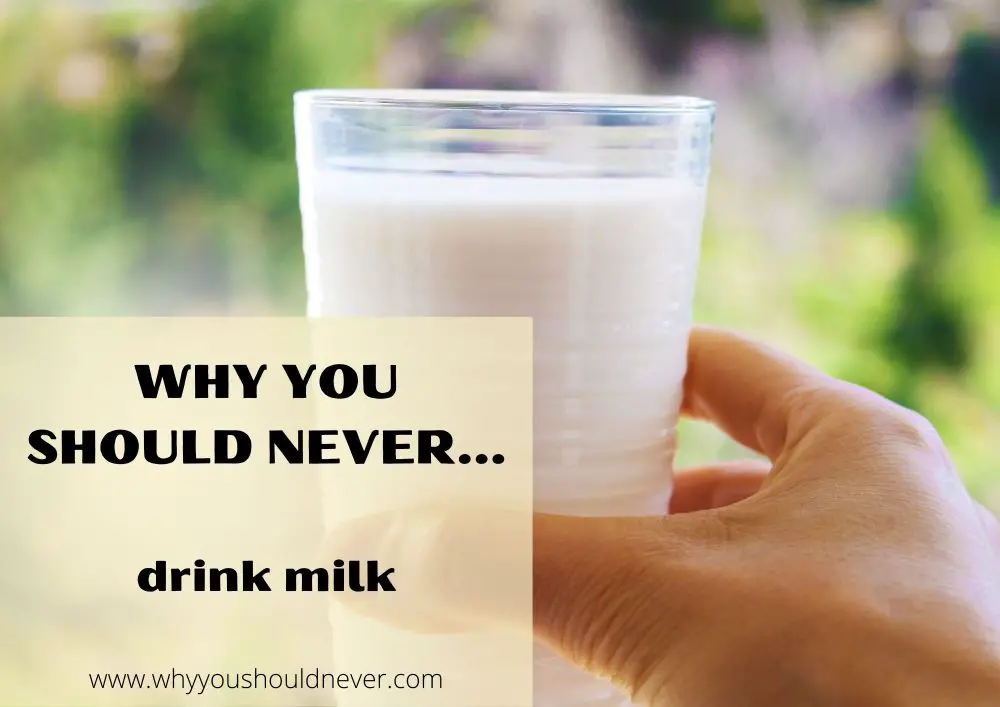![]()
Why You Should Never Drink Milk
You were probably taught that milk does a body good. After all, milk was the first food we ever consumed when we entered this world, and it alone sustained us as babies.
We were told that milk would make us taller, stronger, and healthier. And milk is indeed an excellent source of nutrients like calcium, protein, and vitamin D.
But should you really be drinking milk as an adult? The answer is no, and in this article, we’ll explain why.
8 reasons why you shouldn’t drink milk
1. Milk is full of hormones
One of the main reasons why you shouldn’t drink milk is because it’s full of hormones. These hormones can disrupt your endocrine system and throw your own hormones off balance.
For example, milk from cows treated with the synthetic hormone rBGH (recombinant bovine growth hormone) has higher levels of insulin-like growth factor-1 (IGF-1). This hormone has been linked to cancer.
2. Milk is mucus-forming
Another reason to avoid milk is that it’s mucus-forming. When you drink milk, the proteins and fat attach to the mucus lining in your gut, making it thicker and more difficult to pass. This can lead to digestive problems like constipation, bloating, and gas.
Outside of that, mucus will also coat your throat and sinuses, making you more susceptible to colds, flu, and allergies. You only need to spend half an hour with a heavy milk drinker to see how much they cough, even when they’re not sick.
3. Most people are lactose intolerant
According to the National Institute of Diabetes and Digestive and Kidney Diseases, roughly 68% of the world’s population is lactose intolerant. This means that their bodies can’t properly digest milk and other dairy products.
Lactose intolerance occurs when there’s a deficiency of the enzyme lactase, which breaks down lactose (milk sugar) into glucose and galactose. When lactose isn’t broken down, it ferments in the gut and causes symptoms like nausea, bloating, gas, and diarrhea.
4. Milk can worsen acne
If you’re struggling with acne, you might want to avoid milk. That’s because milk contains hormones that can trigger or worsen acne breakouts.
As we mentioned previously, cow’s milk contains the hormone IGF-1, which has been linked to increased sebum production. Sebum is the oily substance that clogs pores and leads to acne.
Additionally, milk also contains whey and casein proteins, which some studies have shown can contribute to inflammation and breakouts.
5. Milk isn’t necessary for strong bones
For the longest time, we’ve been told that milk is essential for strong bones and teeth. After all, milk is a great source of calcium, which is necessary for bone health.
But you don’t need to drink milk to get enough calcium. And despite what you may have been told, there’s no evidence to suggest that milk prevents fractures or osteoporosis. Thus, cutting it out of your diet will not lead to weak bones.
Many other foods are rich in calcium, such as leafy green vegetables, tofu, nuts, and seeds. And if you’re still concerned about getting enough calcium, you can always take a supplement.
6. Milk contains pus
We’re about to make you very sick!
Pus is made up of living and dead white blood cells, and it’s a sign that the cow’s udder is suffering from something called mastitis. Mastitis is a painful infection that causes inflammation in the mammary gland. It’s usually caused by bacteria entering the cow’s teat.
The FDA allows producers to include a certain amount of pus in their milk, as long as it doesn’t exceed the “somatic cell count”, which is the number of white blood cells in a milk sample. And while the amount is usually pretty small, this is still extremely gross.
7. Animal milk isn’t for humans
It’s important to remember that milk is meant for baby cows, not humans. We’re the only species on earth that drinks milk beyond infancy, and we’re also the only species that drinks the milk of other animals.
Humans are born with the ability to digest their mother’s milk. But as we get older, we start to lose that ability. In fact, by the time we reach adulthood, most of us are no longer able to digest lactose.
So why do we continue to drink milk? Well, for the most part, it’s just a matter of habit. We’re used to seeing milk in the fridge, and we’re used to pouring it on our cereal or adding it to our coffee. But this is wholly unnatural.
8. Milk production is bad for the environment
The dairy industry has a major impact on the environment. First of all, it takes a lot of water to produce milk. A single cow can drink up to 50 gallons of water per day.
And then there’s the issue of methane. Cows release methane gas through flatulence and belching. Methane is a powerful greenhouse gas that contributes to climate change.
Additionally, the dairy industry is one of the leading contributors to water pollution. The large amount of manure produced by dairy farms ends up in rivers and lakes, where it pollutes the water and harms wildlife.
Alternatives to animal milk
Human adults don’t need to drink animal milk, especially now, when there are so many plant-based alternatives available that taste just as good, and sometimes better, than cow’s milk. These alternatives include:
- soy milk
- almond milk
- oat milk
- rice milk
These are all great substitutes for cow’s milk. And unlike cow’s milk, they’re completely vegan and often fortified with nutrients like calcium, vitamin D, and vitamin B12.
So if you’re looking to improve your health or reduce your environmental impact, ditch the cow’s milk and try one of these plant-based alternatives instead.
